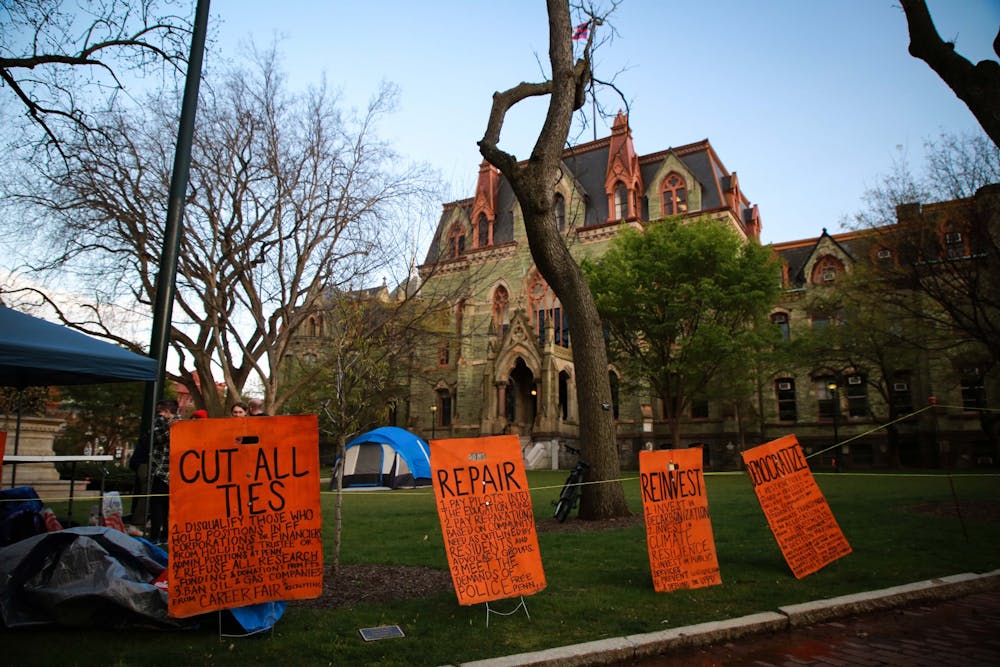
Protestors in Fossil Free Penn put up signs on College Green, demanding Penn to divest from fossil fuels and to reinvest in other climate justice-related initiatives.
Credit: Jesse ZhangIn April 2021, I joined with a Penn student leader to chastise Penn’s administration for weak policies regarding climate investments. For at least a decade, students have been petitioning Penn to drop its investments in fossil fuel companies, and Penn has been a laggard compared with our peers.
To give credit where it is due, the recent announcement by President Liz Magill and Board of Trustees Chair Scott Bok indicates some progress. “Today,” said the announcement, “Penn does not directly hold investments in any companies focused on the production of fossil fuels. This includes Penn holding no investments in two hundred of the companies with the largest potential carbon emissions content in their reserves.” These 200 companies focused on coal, oil, and gas production are among the 90 or so “carbon majors” (including state-owned enterprises) responsible for most global greenhouse gas emissions.
Penn’s announcement of its divestment of these direct holdings is a step in the right direction, but it is important to understand also that Penn does not directly hold most of its investments. The bulk of Penn’s endowment is invested indirectly through various outside asset managers, and Penn does not disclose what percentage of these investments are currently invested in the financing, production, and sale of fossil fuels. Penn deserves one cheer for direct divestment, then, but full congratulations must await greater transparency and proven progress on reducing indirect investments in the carbon majors. Greater transparency might be improved by acceding to the recent suggestion that some representation should be granted to Penn students on the Board of Trustees. Following Cornell University, maybe faculty and staff could even have representation, too!
A second cheer should greet Penn’s announcement that the University has committed to invest more in what might be called long-green strategies. Penn’s investment of $250 million in the energy transition is a small drop in its $20 billion endowment bucket. But it’s a start, and there is a commitment that these investments will grow over time so that more of Penn’s investments will be targeted to being part of the climate solution, rather than further aggravating the problem.
Because there remains a lot of room for improvement, Penn doesn’t yet deserve a full-throated three cheers. Still, the overall tone of its recent statement signals that the Magill administration is taking the climate emergency more seriously than the previous one with respect to Penn’s complicity in connection with its endowment investments, as well as our everyday operations.
Students who have been protesting for change over the last decade, including various iterations of Fossil Free Penn, deserve to give themselves a measure of credit. This doesn’t mean the large and complicated question of divestment is no longer of concern. A next step would be to create a campus group including faculty, student, and staff representatives to receive regular assurances that the Office of Investments is in fact walking the talk, and moving quickly.
One possibility is to repurpose the Social Responsibility Advisory Committee to serve as an institutional place to encourage the Office of Investments and perhaps one or two members of the Board of Trustees to communicate directly with faculty, students, and staff representatives about investment policies and practices, including progress on climate commitments. I’ve served previously on this committee, and its role in reviewing proxy statements was really not a good use of time. Upgrading this committee to have a broader purview would improve transparency, communications, and understanding among members of the Penn community on endowment investment issues.
Another possibility for a next step would be for Magill and the new provost (when appointed) to follow Harvard University and appoint a vice provost for climate and sustainability. At the University Council meeting in December, the fragmented nature of Penn’s approach to climate policies was again on display — dividing an operational approach and an academic one, with both further fragmented by the reality of 12 schools and many climate-related academic centers, initiatives, programs, and plans. The complexity and interdisciplinarity of the climate challenge demands greater powers of coordination and communication within Penn.
Creating this new position would also put Penn in a better position to follow Harvard in fundraising for a new entity similar to the Salata Institute for Climate and Sustainability, established this summer with a $200 million gift. Penn’s campus is more compact and integrated than Harvard’s, and there is no reason that we cannot compete — and cooperate — with other leading universities to develop climate solutions, leveraging our own unique strengths. Like Harvard, Penn is organized in a decentralized structure, and the idea is not to create some sort of giant institutional center to subsume or, even worse, suppress the rich diversity of climate-related work around campus. Better coordination and communication, however, are nonetheless needed.
Penn cannot afford to rest on its laurels, stopping to congratulate ourselves for becoming more virtuous while the Earth continues to burn — and while all climate health indicators continue to deteriorate. At the same time, we should recognize progress when it occurs — and then come together as a community to find ways to begin to move the very large climate needle in the right direction. Or to borrow a phrase: to discover how we can best “draw down the lightning” on this existential problem, because the climate can’t wait.
ERIC ORTS is the Guardsmark Professor of Legal Studies and Business Ethics at the Wharton School. He is also a founding member of the Faculty Senate’s Committee for an Institutional Response to the Climate Emergency. His email is ortse@wharton.upenn.edu.
The Daily Pennsylvanian is an independent, student-run newspaper. Please consider making a donation to support the coverage that shapes the University. Your generosity ensures a future of strong journalism at Penn.
Donate







